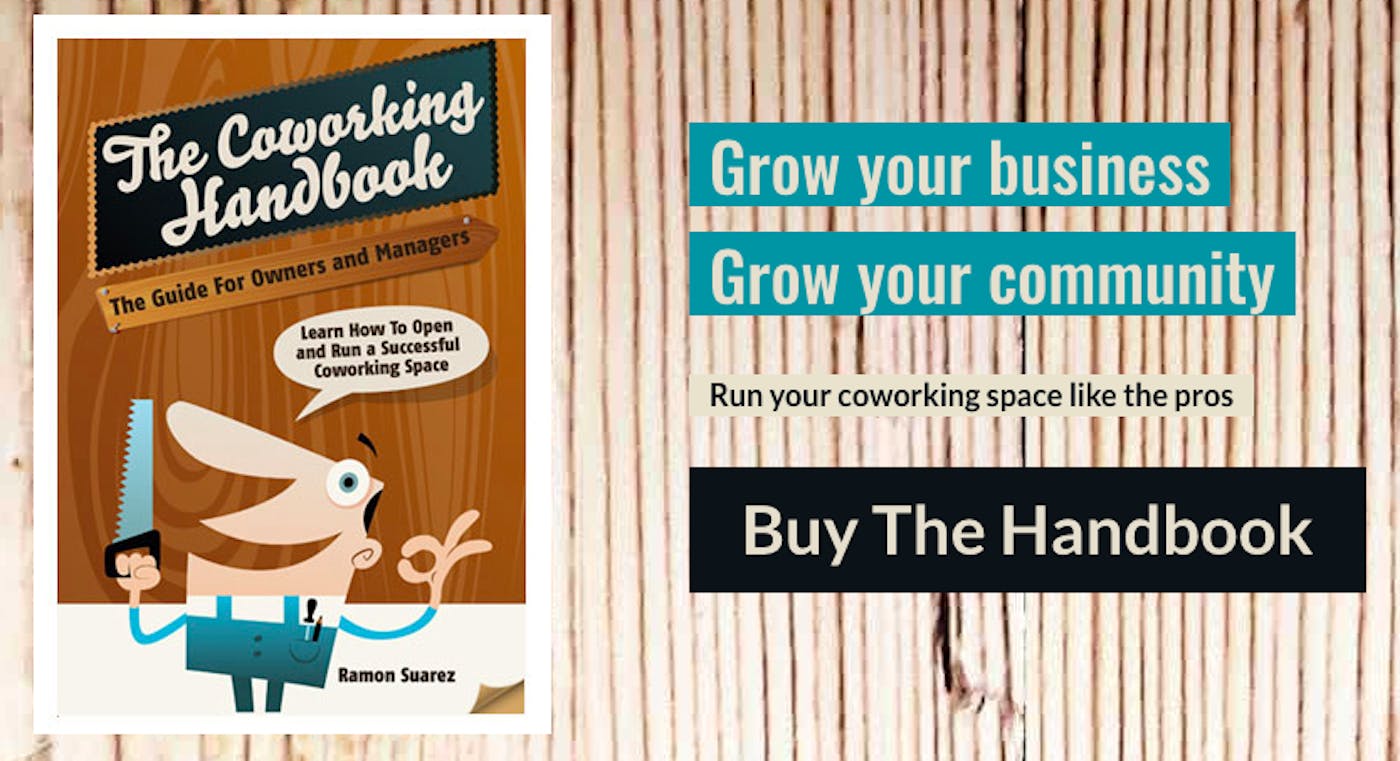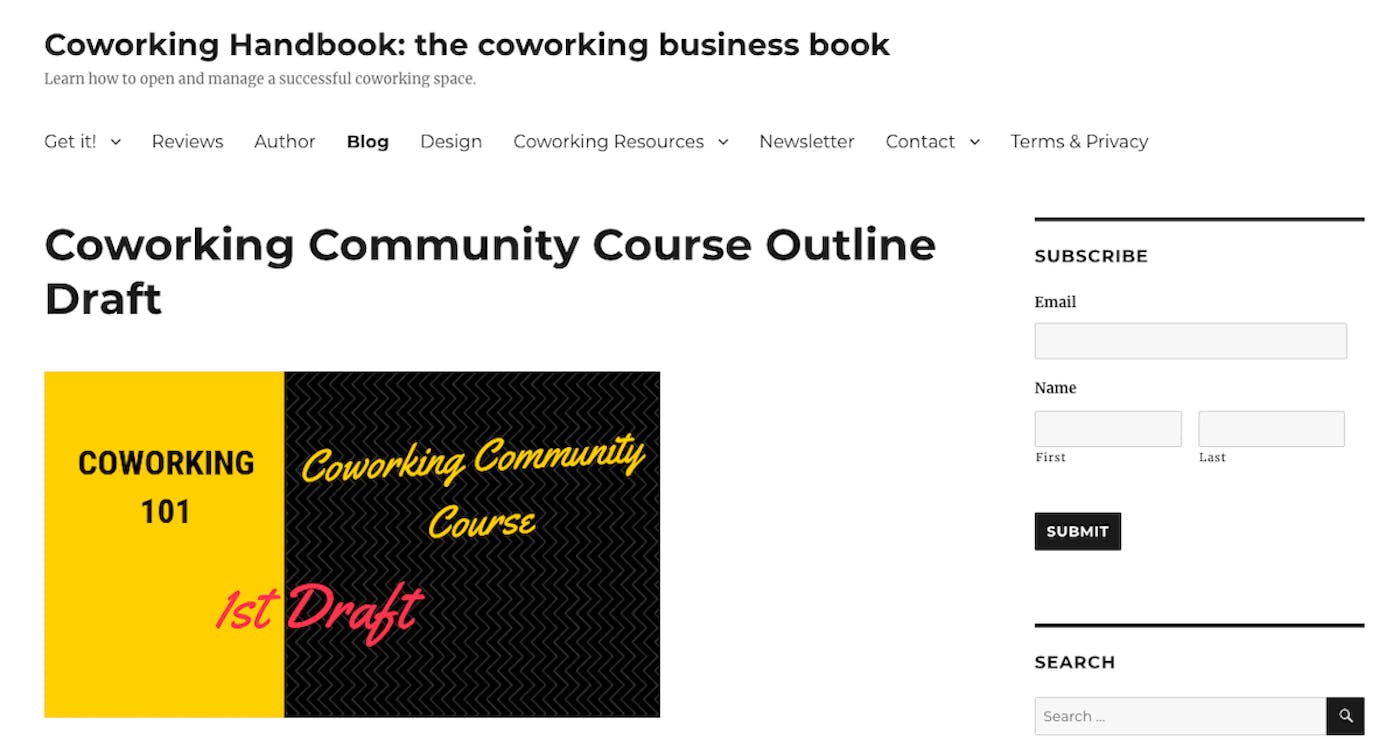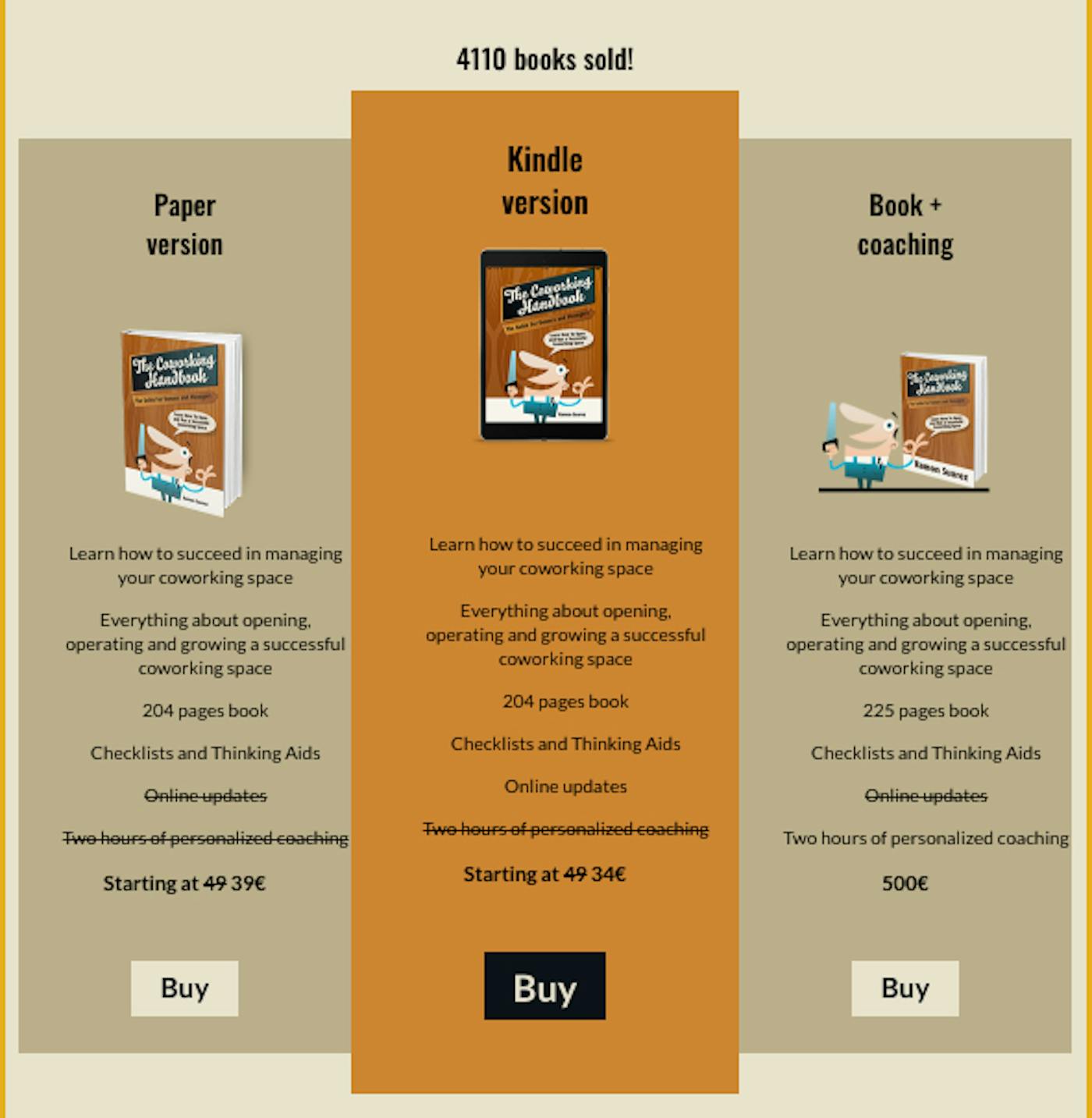Moving Beyond Self-Doubt to Write a Handbook Grossing Over
$50k
Hello! What's your background, and what are you working on?
I'm Ramon Suarez, entrepreneur and author of The Coworking Handbook, currently on a quest to find my next businesses (side hustles and main project). Right now I'm working on a coworking community course as part of my entrepreneurship challenge, where I am launching at least one challenge project every month. At present, I am on my fourth project.
I have a very eclectic background that has a marketing and communication backbone. I've worked on the production of TV music shows and fashion magazines, as a journalist, and on public affairs as Assistant to the President of the NATO Parliamentary Assembly. My last company was the Betacowork Coworking Brussels, a coworking space created to help and activate the people around the startup scene in Brussels. I sold the coworking space a year and a half ago to three of the coworkers who are also entrepreneurs in order to focus on launching new businesses and on my family (I started having babies at 45).
The Coworking Handbook and the resources added through the website were written to help operators and owners of coworking spaces start and run their business. I wanted to help them be successful faster and with less stress. It is a practical book focused on what to do and how to do it.
The book has grossed a bit over $50,000 since I launched it on April 2014. The best it has done in one month is $1,200 and it is now averaging a bit over $400 a month. I did get €20,000 to translate it into French and Dutch but spent it all on the translations (done by members of my coworking space).

What motivated you to get started with The Coworking Handbook?
As part of the learning journey linked to the creation of my coworking space, I ended up participating in a lot of conferences and helping people out with their coworking projects. I learned that there was no singular resource or manual that could help them launch their business or prompt thoughtful questions about the endeavor, so I thought about writing one.
Heading to the USA for a coworking conference, I took advantage of the long flight and wrote a draft outline for The Coworking Handbook. I had a few days before the coworking conference started, and while I was enjoying SXSW (South by Southwest Conference & Festivals) I shared the draft with a few people. The day before the conference I decided to test it out with a single page website (the service does not exist anymore). When thinking about what domain to buy and what to name the product, I toyed with a few ideas that:
- Made it clear that it is a manual
- Included the word "book"
Coworking book was taken, so I went for coworking handbook. The next day I sold the first book, to a programmer who was a client at my coworking space back home. I sold 10 copies during the conference, which was enough for me to continue the effort. I assumed that the book would not have many sales, but knew that it was needed and could help a nascent micro-niche of coworking space operators. I wanted to help and was really bothered by the idea that there wasn’t already something out there, so I got to it. This is a pattern that has repeated over and over throughout my life; this compulsion to help, advise, and support others is a part of my personality that has driven me towards a lot of interesting ventures (and also caused some suffering).
My expertise came from previously having had to learn to run a coworking space, plus all that I knew about marketing and business. I learned a lot within the three-year span that I was developing the coworking space, and it was fresh enough to be able to write a manual. Plus, this was my third manual, so I had a handle on how to go about the process. I had previously written a manual for MacOS X Jaguar and another manual for the European Constitution. You can see the pattern: Help others acquire knowledge that empowers them to make informed decisions, become self-sufficient, build, and take action. That's also what drove me to do a lot of volunteering and to end up being one of the pillars of the tech startup ecosystem in Brussels.
What went into building the initial product?
Thinking in practical terms made it easier to come up with the draft. The process of writing itself made it easy to see the changes that were needed. Back then, I had reached out to another coworking space owner, Jaime Aranda, who I thought was doing great things. He ended up being a collaborator on the book and we spent a week in his coworking space getting chapters out and sharing them with the backers of the crowdfunding campaign. The book was coming out regardless, but we decided to launch the crowdfunding to pre-sell some books and pay for the editor to proofread. We would have been happy to get to $1,000 but ended up getting $3,111, and in the process discovering that we had a considerable amount of community support.
I did not track all the time that it took to work on the book, the website, and the campaign, but I would say about three solid weeks. I write fast and, in general, I am hyper-productive when I'm in the zone. I wrote my MacOS book in a similar timeframe while holding down a full-time job, the editor told me I had beaten all previous records. The collaborative component of the process took a lot of effort and time.
There's nothing magic about writing a book in terms of technology, you just need a platform on which to do the actual writing. If you’re working collaboratively as I was, you also need a writing platform that enables you to easily share work. We used Open Office and MS Word and shared everything via Google Drive. The pain was in the style changes of using different programs and versions of the same program. I work exclusively on Linux (Ubuntu) and the people I worked with used a mix of Windows and MacOS computers. The best way to work is online (my favorite is Google Docs) and not sync documents to your computer or work locally (had too many problems syncing with Dropbox and InSync).
How have you attracted users and grown The Coworking Handbook?
Back then I had already built a name for myself in the coworking conferences in the USA and Europe, and I had a sizable following on social media (mostly on Twitter) that was much more engaged than today. I made heavy use of social media, wrote on the coworking handbook blog, started a mail list, shared on the coworking Google group, spoke at conferences, and asked people for help.
Running the crowdfunding campaign was very helpful with the grind because it forced me to promote it daily and to think of new and creative ways to get the word out.
Surprisingly, what helped sell more books was raising the price. The sweet spot was $39.95. I guess people didn’t take it seriously when it carried a cheaper price tag. In fact, none of the discount sales I've run have worked to increase sales. I did give away 2,500 books by mistake one day when I made the Kindle ebook free to send to the backers (which you can't normally do). This mistake helped me climb the rankings, which ultimately helped me sell more, but I can’t really quantify this.
Getting the books to the backers was a pain, especially the Kindle books. I had to manually send a voucher for each one and many did not even use it. Working with different Amazon country stores turned out to be a pain for the buyers, so I wrote a post to explain how to claim ebooks if your Kindle is not registered in the same country. This post is one of the most read posts in the blog and is still bringing in traffic today.
I asked the people in the mail list and my followers to write reviews and I also sent out a few books to influencers that could write a review. The latter didn’t really work, but it gave me a few good tweets I could use to market the book. Count your victories where you can, I guess.
The other thing I did was to build repositories of coworking resources. There's some good information out there but it is scattered and surprisingly hard to find. As an example, one of the pages that brings the most traffic to the site is the repository of coworking statistics.
The choice to use Amazon as a discovery and sales platform for the book was very helpful, and I got a kickback with the referral links I included in the site that I've used to buy a lot of books. I tried selling the book on the Apple and Android markets, Barnes & Noble and other platforms, but they never make any real money and they detracted from the Amazon ranking, so I stopped doing it. Too much extra complication for no real benefit.
What I'm implementing now is an onboarding email campaign. I'm also adding lead magnets. I've scanned my mailbox and emailed over 11,000 people to see if they wanted to hear from me, which has gotten more people into the mail list.
Right now I'm considering making the book available as a PDF and thinking of ways to promote it, but I must admit that I'm at a bit of loss. I will probably make it a short challenge project to try to kickstart some inspiration. Ideas are welcome and appreciated.
The best advice I can give is to do stuff. Working on things makes your brain sharper, you learn skills that you can use in the future, and end up building stuff that matters and can bring revenue or other rewards.

What's your business model, and how have you grown your revenue?
I sell books online and get paid in royalties by Amazon, and also get vouchers to buy books via the affiliate links in my website. I've also sold some books at conferences, but this is more of a marketing and branding opportunity than a sales opportunity.
The biggest sale I got was the $20k to do the translations. After going to an event of the Pulse Foundation, where they said that they wanted to promote coworking in Belgium, I proposed doing a translation into the two main languages of the country. The President of the foundation, Paul Bosmans, is a member of Betacowork, and through his experience, he understood the impact that my manual could have for entrepreneurs and professionals.
The revenue from the book is a nice side hustle surprise, but it’s not something I count on since it can disappear any minute. I'm very happy to get it and I deserve it because of all the effort that has gone into it, and all the value that others are getting. After all, I'm helping people earn a living and deliver more value to their coworkers.
All payments and shipping are managed by Amazon, which is great. Having books around you takes up a lot of space and is a mammoth effort to package and send. I prefer to let Amazon do the job so I can concentrate on other things.
Raising the price raised sales, but only to a point. The moment I went over $40 sales dropped off. Typical payments from Amazon are between 35% and 60%. They can go up to 75% of the listed price for the Kindle ebook if you sell it under $10, but my experience is that you sell a hell of a lot more paper books than ebooks, you charge more for them and you get a higher royalty. So I push the price of the Kindle version up to motivate buyers to get the paper book that pays around 60% royalty. Reducing the price of the ebook to $9.99 has had no positive impact on Kindle sales.
Tracking your revenue through Amazon is a pain. There are different reporting systems for Create Space and KDP (Kindle Direct Publishing). For example, in KDP they show you your sales during the last thirty days, but they do not show anywhere the total number of copies sold. So tracking sales has always been an issue, but as I'm not actively advertising at the moment, it’s not something that I want to spend too much time on. I use BookTrakr to have a general idea of the online sales, and for now it’s enough. What matters to me are the trends, the future.

What are your goals for the future?
I'm currently making online courses based on The Coworking Handbook that extend beyond what is written there. The main focuses are community and sales.
I already have a draft for the community course and also the marketing part of the sales course (you can’t understand one without the other). I decided to make the community online course first since it’s the shortest one. It’s hard to do something for the first time, and I don't want to make my life any harder than need be.
To grow my mail list, I've gotten the master documents from the layout editor so that I can include and test different lead magnets.
Another thing I want to do is revamp the website with a mobile theme, and to work on the lead magnets and email automations. I would also like to finish the translation into Spanish and I'm thinking about launching a restricted community of practitioners.
What are the biggest challenges you've faced and obstacles you've overcome? If you had to start over, what would you do differently?
The biggest obstacle I faced was self-doubt, which led to procrastination and unnecessary suffering.
The worst mistake I made is not including a lead magnet in the free previews of the book. I would have gotten a much bigger mail list and better sales. There are a few subscription links in the book, but the next time I will include a lot more downloadable resources sitting behind a signup form and linked to multiple times within the text.
Even though there are great people out there doing interesting things, I would prefer to write alone in the future. It saves a lot of time and the final product is better because you don't have to leave text in that you don't like in order to not hurt someone’s feelings or work extra hard on coordinating all the text. I've coordinated an edition of another book, and there's just too much extra work involved in matching language, styles, and content.
I doubt that I’ll outsource for the layout again. The fancy layout has gotten worse reviews than the basic one that I did myself. Big letters and easy to read text matter more than looks and save you money and work.
The last thing not to do for the future is to translate the books. Translations are really expensive and it is very hard to recuperate your investment. It is better to focus some of that money on advertising one single language book. Promoting a book in four languages is just too hard.
Have you found anything particularly helpful or advantageous?
Being open and helpful at conferences and online helped build relations that bolstered the promotion of the book. As an example, Tony Bacigalupo wrote the intro of the book and helped me stage the launch of the book in New York.
This book was really helpful in easing my way into self-publishing, and experience that has been 100% positive. Publishing on Amazon was a great decision. It provided the market and took care of a lot of work.
Importantly, the book went out early enough in the growth of coworking to capture a growing market of operators.
What's your advice for indie hackers who are just starting out?
My top advice is to work on projects and get things done. Your main tool is your brain, and you have to keep it sharp through practice. Isolated theoretical thinking is not conducive to practical outcomes. Going through the motions and just doing will make you advance in your thinking, in your skills, in your reflexes, and in your businesses.
Having said that, reading and listening to podcasts can be very motivating and inspiring. They’re a good tool to have in your pocket, but they shouldn’t take the place of practice.
The most helpful book I use and recommend is Running Lean by Ash Maurya. It is full of practical advice and guides that make it much easier and faster to build out and implement ideas. I keep a list of helpful books for businesses and coworking here.
Where can we go to learn more?
Ask in the comments, read the book, reach out via social media, use the contact pages of my sites, and subscribe to the mail lists.
- Get The Coworking Handbook on Amazon
- The Coworking Handbook website and blog.
- My website ramonsuarez.com, where I talk more about entrepreneurship and where I'm publishing the outcome of my challenge project.
- Mail lists (choose the subjects you care about)
- Coworking resources, like coworking stats and how to make your coworking space business plan.
- Business and coworking books
- Twitter: @cohandbook and @ramonsuarez
- Facebook: @coworkinghandbook and @ramonsuarezdotcom
- Pinterest and Instagram
